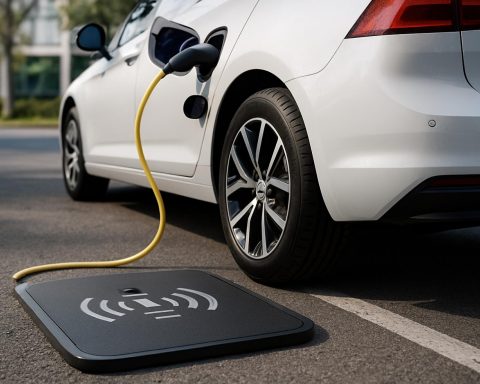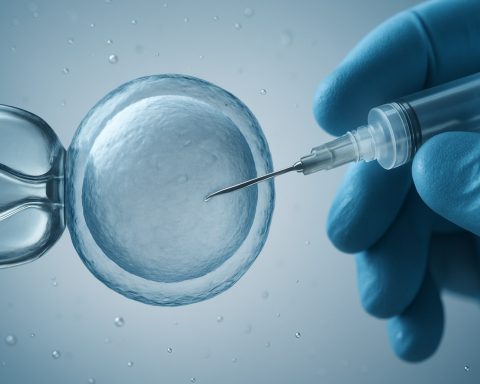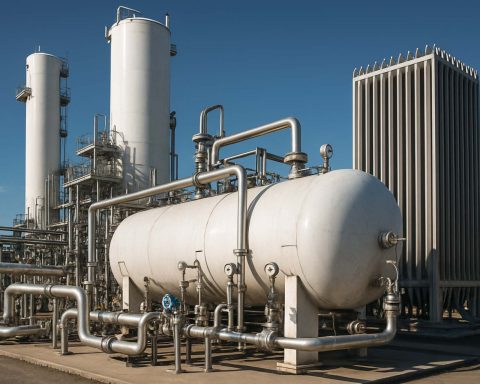- A $400 million federal plan to purchase armored electric vehicles, specifically Teslas, has sparked significant debate among lawmakers regarding its motives and legality.
- U.S. Representatives Gregory Meeks and Jared Moskowitz are central to the investigation, questioning potential backdating and document modifications supporting the acquisition.
- Tesla’s promotion at international exhibitions suggests a push towards ecological and performance advancements in America’s transportation sector.
- The State Department’s budget allocation of $483,000 for 2025 contrasts starkly with the initial $400 million estimate, prompting scrutiny of procurement practices.
- Elon Musk’s involvement adds complexity, raising concerns about conflicts of interest due to his influential position in the White House.
- The situation highlights the necessity for governmental transparency and accountability in spending public funds, as Democrats seek clarity from Secretary of State Marco Rubio.
- The outcome of this controversy will influence both policy and the broader governance landscape in America.
Tension crackles through the halls of Washington like a live wire, as an ambitious electric vehicle acquisition plan has ignited a fierce debate among top lawmakers. When news surfaced of a planned $400 million purchase of armored electric vehicles—specifically Teslas—questions erupted regarding the motives and legality behind this audacious federal endeavor.
The backdrop to this drama involves two high-profile federal figures—U.S. Representatives Gregory Meeks and Jared Moskowitz. These doughty Democrats, experts in international policy and oversight, found their focus riveted not on foreign landscapes but on an internal controversy that reverberates through the gears of federal operations. Their intrigue grew from a startling document initially linking the grand acquisition to the previous administration, beneath the shadow of a relentless political chess game.
With Tesla’s sleek, futuristic machines commanding center stage at international exhibitions such as July’s Electrify Expo, America’s transit ethos seemed to be teetering at the edge of a new era, promising ecological advancements and robust performance. However, beneath the shine, the murky confines of procurement policy have sparked concerns over potential irregularities. Allegations hint at documents subtly edited to blur the true origin of the electric vehicle proposal, sparking debates over possible backdating and document modification to align the deal’s inception with earlier strategic goals.
While the State Department tentatively budgets a meager $483,000 towards this green automotive leap in 2025—a fraction of the looming $400 million initially earmarked—the discrepancy demands an urgent examination of bureaucratic rigor and ethical integrity.
The involvement of billionaire Elon Musk adds another layer of complexity to this unfolding mystery. With his high-ranking role in the White House, whispers speculate on potential conflicts of interest as Tesla—and Musk’s ambitions—loom large over this transaction.
The takeaway from this convoluted tale extends beyond the numbers and energy-efficient wheels. It underscores the imperative for governmental transparency and accountability, especially when public funds become the engine powering national transitions. As Democrats urge Secretary of State Marco Rubio for clarity on who navigated this fiscal detour, the onus falls on Washington to untangle this web, ensuring that ambitions align with legal and ethical standards.
Whether this electrifying mystery charges forward to achieve its green potential or stalls in the high beams of congressional scrutiny will shape not just policies, but the landscapes of modern governance. As the political saga unfolds, the American public remains alert, trusting that the motives behind this controversial automotive trajectory are worthy of the investment—and the legacy—it promises to leave.
Are Federally Funded Tesla Armored Vehicles Driving Controversy in Washington?
The recent revelation of a $400 million plan to acquire armored electric vehicles (EVs), particularly Teslas, by the U.S. government has ignited controversy in Washington, sparking debates centered on transparency, ethics, and governance. Below, we dive deeper into the intricacies of this plan, its implications, and what the future might hold for such ambitious projects.
The Debate Over Electric Vehicle Procurement
Background Context:
The proposed acquisition of Tesla vehicles has brought U.S. Representatives Gregory Meeks and Jared Moskowitz into a dispute focusing on procurement transparency. As oversight experts, they are examining allegations of document manipulation that align the initiative with previous strategic objectives, potentially involving backdating and deliberate modifications.
Key Concerns:
– Transparency and Legality: The oversight investigation aims to uncover whether the procurement process violated any legal standards due to altered documents or conflicted interests.
– Budget Discrepancies: The initial earmarked amount of $400 million starkly contrasts with the State Department’s projected $483,000 for 2025, highlighting inconsistencies that demand scrutiny.
Industry Trends and Market Forecast
Growing Demand for Electric Vehicles:
As the global appetite for sustainable transportation grows, electric vehicles are increasingly becoming a focal point for government policies worldwide. The International Energy Agency predicts that by 2030, EVs could account for over 30% of the global automobile fleet. This trend suggests an ongoing opportunity and market expansion, albeit with necessary governance and infrastructure adaptations.
Tesla’s Dominance and Innovations:
Tesla remains a titan in the EV industry, renowned for its groundbreaking technology and market share. If this procurement comes to fruition, it could bolster Tesla’s influence further, yet increase scrutiny on Elon Musk’s role in related governmental policies.
Pressing Reader Questions Addressed
1. Why Armored Teslas?
The choice of armored Teslas is intriguing from both a security and environmental perspective, suggesting a dual objective to enhance safety while advancing green initiatives.
2. How Does This Deal Impact Tesla and Elon Musk?
A successful deal would significantly strengthen Tesla’s market position and potentially raise questions regarding Musk’s influence in governmental decision-making due to his association with the current administration.
3. What Are the Legal and Ethical Implications?
This scenario underscores the importance of transparent procurement processes, emphasizing the need for strict oversight to prevent conflicts of interest and ensure public trust in governmental decisions.
Actionable Recommendations and Tips
– For Policymakers: Implement stringent policies requiring independent audits for all substantial procurement projects to ensure transparency.
– For Consumers: Stay informed about EV initiatives and their potential for industry-wide transformation.
– For Industry Watchers: Monitor market trends and policy changes as they could signal bigger shifts toward sustainability.
In conclusion, this federal acquisition proposal serves as a critical reminder of the careful balance needed between innovation and accountability. Ensuring that the potential benefits do not overshadow ethical considerations remains crucial. As this story continues to unfold, all stakeholders must champion transparency and diligent governance to maintain public confidence.
Learn more about the industry and Tesla’s innovation by visiting their official site. Stay updated on policy changes at the U.S. State Department’s website.







